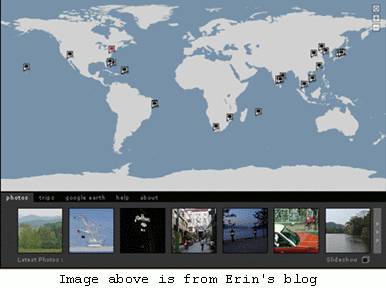

ASSOCIATES (2007, July, v. 14, no. 1) - associates.ucr.edu


 Michael D. Brooks
Michael D. Brooks
Saint Joseph’s University
Francis A. Drexel Library
Philadelphia, PA
 Once upon a time there was a cataloging librarian who went to sea on a luxurious cruise ship. She sailed away for 100 days and saw the world in a manner most people won’t ever see. She sailed the high seas for a semester and met all sorts of interesting people, ate interesting food, visited exotic lands, and learned a lot. During her voyage, she wrote about her travels and posted her musings for the edification of all on a blog. Nearly every day, her fans followed her “librarian at sea” adventure around the world with awe, wonder, bemusement, and eager anticipation of what she would write about next. She shared her thoughts and her pictures in a daily blog called “sea-ville.” <http://sea-ville.blogspot.com/>
Once upon a time there was a cataloging librarian who went to sea on a luxurious cruise ship. She sailed away for 100 days and saw the world in a manner most people won’t ever see. She sailed the high seas for a semester and met all sorts of interesting people, ate interesting food, visited exotic lands, and learned a lot. During her voyage, she wrote about her travels and posted her musings for the edification of all on a blog. Nearly every day, her fans followed her “librarian at sea” adventure around the world with awe, wonder, bemusement, and eager anticipation of what she would write about next. She shared her thoughts and her pictures in a daily blog called “sea-ville.” <http://sea-ville.blogspot.com/>
For one hundred days, this intrepid cataloger from the University of Virginia (by way of Saint Joseph’s University, wink, wink) became part of a growing trend of “citizen journalists.” As she sailed from port-to-port as part of the University of Virginia’s Semester at Sea program (SAS) <http://www.semesteratsea.com/> she kept her friends and colleagues informed of her experiences by blogging. Not only did she keep her fan club informed of her itinerary, but she also posted pictures and responded to reactions and impressions from blog readers.
Blogging is becoming a viable method of expressing views, opinions, ideas, and sharing them with others in a non-traditional method of journalistic reporting. Blogs have enabled many of the soldiers fighting in Iraq and Afghanistan to report on the war from their perspective. These blogs are known as Sblogs (soldier blogs). It is certainly a viewpoint you won’t get from embedded journalists or the wire services. A few sites that host sblogs are: Military Blogs <http://www.aapavatar.net/blogs.htm>, Military.com <http://www.military.com/blog>, and MILblogging.com <http://www.milblogging.com/index.php>.
Blogs are generally free to establish and easy to maintain. They are basically journal entries entered chronologically but displayed in reverse chronological order. In other words, the newest entry will be at the top of a page and the oldest will be at the bottom of a page. All older entries are dropped down the page. The content of a blog will usually depend on the subject matter and the dedication of the blogger—you. (The Electronic Frontier Foundation <http://www.eff.org/> provides a page of legal information for bloggers at EFF: Legal Guide for Bloggers <http://www.eff.org/bloggers/lg/>.)
If you’ve ever thought that a blog would be a good idea to discuss the goings on at your library with faculty, staff, students, and library patrons, and the community it services, establishing a blog might be just the thing you need to generate ideas, promote the library, make announcements, get feedback, and share in an exchange of information only a blog can offer. A Wikipedia article, “Blog,” <http://en.wikipedia.org/wiki/Blog> contains a historical perspective of blogs and their evolutionary development, as well as useful links.
There are many sites that host blogs and provide assistance in setting up and maintaining one. A brief list of information about blogs follows.
Library Weblogs
<http://www.libdex.com/weblogs.html> Library Weblogs.
The Internet Public Library: Blogs
<http://www.ipl.org/div/blogs/> The Internet Public Library.
"Why and How to use Blogs to Promote Your Library’s Services"
<http://www.infotoday.com/MLS/nov03/fichter.shtml> Information Today, Inc.
“Blog How to’s and What are Blogs”
<http://www.librarysupportstaff.com/4blogs.html> LibrarySupportStaff.com.
“Weblog Software”
<http://en.wikipedia.org/wiki/Blog_hosting_service> Wikipedia: the free Encyclopedia.
Blogger
<https://www.blogger.com/start> Blogger.
First Serial Rights Only.
©2007 by Michael D. Brooks